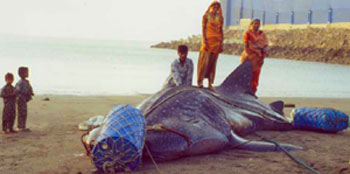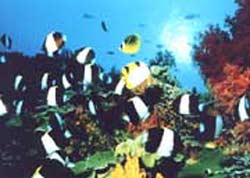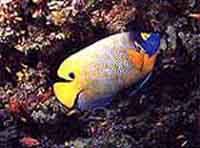| Environment Saving the Whale Shark
|
|||||
Visualise a shark being captured by fishermen, its fins being cut off and then callously being tossed back into the ocean to die. Why? Because shark fins have long been considered a delicacy, especially in the Far East. In the past decade the trade in shark fins increased 2,500 per cent. The fins themselves are tasteless but are used to thicken soup. How many sharks are killed each year? Approximately 130 million. Who would have thought that after 65 million years of evolution they would end like this? |
Environment • Islands • My Friend the Ocean • The Ocean & My Story
Travelogues
Scuba Diving
Leisure & Adventure | ||||
 Picture a gentle whale shark, the largest fish in the ocean, swimming slowly from Australia, into the Indian Ocean and approaching the shores of India only to be harpooned and slaughtered here.
Picture a gentle whale shark, the largest fish in the ocean, swimming slowly from Australia, into the Indian Ocean and approaching the shores of India only to be harpooned and slaughtered here.
In early 2001, I was invited to view Mike Pandey's documentary, 'Shores of Silence - Whale Sharks in India'. It was a heart rending documentary. Mike Pandey had earlier won the coveted International Green Oscar for his documentary "The Last Migration - Wild Elephant Capture in Sarguja". His next film documented the slaughter of whale sharks on the Western coast of India. Shot under extreme conditions, the film had taken him almost 3 years to complete. His aim was to create policies that ban the killing and trade of whale sharks from India. The film showed in horrific detail the slaughter of these gentle creatures by fishermen. After the film, Mike spoke of the necessity of finding sustainable alternative means of livelihood for the fishermen.
Recognising the danger to the species, the fishing of whale sharks had already been banned in Indian Ocean countries such as Maldives, Seychelles and the Philipines as well as in the continent of Australia. The problem with species that migrate all the way from Australia to India is that the protected status which they enjoy gets negated when they migrate to countries where they do not get the same protection.
The film created huge awareness. A collective effort was also being made by various organisations such as Sanctuary Asia and Reefwatch Marine Conservation. Mr. S.C. Sharma, Additional Inspector General of Forests (Wildlife) was extremely helpful and accessible. Maneka Gandhi who was then Minister for Social Justice and Empowerment was approached to help. A TRAFFIC-India report titled Gentle Giants of the Sea by Fahmeeda Hanfee was released on 11 April 2001.
This is a giant step. But the killing will not stop. The killing will only stop when awareness grows and the demand stops. Lets stop ordering shark fin soup and stop restaurants from serving it. Let's create awareness. It will be a small step but who knows where it might lead. We need to protect this planet from ourselves.
Will you e-mail this page to a friend? Just click on the link at the top right.
|
|||||
Editor: Romola Butalia (c) India Travelogue. All rights reserved. |
|||||
 What happens when you start decimating an apex predator of the ocean that is endangered and reproduces slowly? You destroy a living species, the ecological balance and the entire eco-chain.
What happens when you start decimating an apex predator of the ocean that is endangered and reproduces slowly? You destroy a living species, the ecological balance and the entire eco-chain.  Whale Sharks had been noticed arriving at the Gujarat coast for over a century. Killing of whale sharks started to cater to the growing international demand for whale shark fin and meat. Whale Sharks visit us between November and April each year along with large schools of sardine, tuna, mackerel and others. The fishery trade became active in areas such as Veraval and Okha. Being gentle and docile, these creatures came close to shore only to become a target for harpooning by local fishermen. The fish, some of them weighing up to 8 tonnes, were harpooned, towed to shore and cut up for meat. More than 1,500 whale sharks were killed in India in 2000. While the fish dwindled, the traders made money from the killing. Four dried fins fetched as much as Rs.15,000 -17,000.
Whale Sharks had been noticed arriving at the Gujarat coast for over a century. Killing of whale sharks started to cater to the growing international demand for whale shark fin and meat. Whale Sharks visit us between November and April each year along with large schools of sardine, tuna, mackerel and others. The fishery trade became active in areas such as Veraval and Okha. Being gentle and docile, these creatures came close to shore only to become a target for harpooning by local fishermen. The fish, some of them weighing up to 8 tonnes, were harpooned, towed to shore and cut up for meat. More than 1,500 whale sharks were killed in India in 2000. While the fish dwindled, the traders made money from the killing. Four dried fins fetched as much as Rs.15,000 -17,000.

 Good things do happen. I was delighted to hear that India has placed all sharks on Schedule I of the Wildlife (Protection) Act, 1972 making their killing illegal. The MoEF notification, dated July 11, 2001 finally brought protection to species such as sharks, sea cucumbers, sea horses, sponges and corals.
Good things do happen. I was delighted to hear that India has placed all sharks on Schedule I of the Wildlife (Protection) Act, 1972 making their killing illegal. The MoEF notification, dated July 11, 2001 finally brought protection to species such as sharks, sea cucumbers, sea horses, sponges and corals.